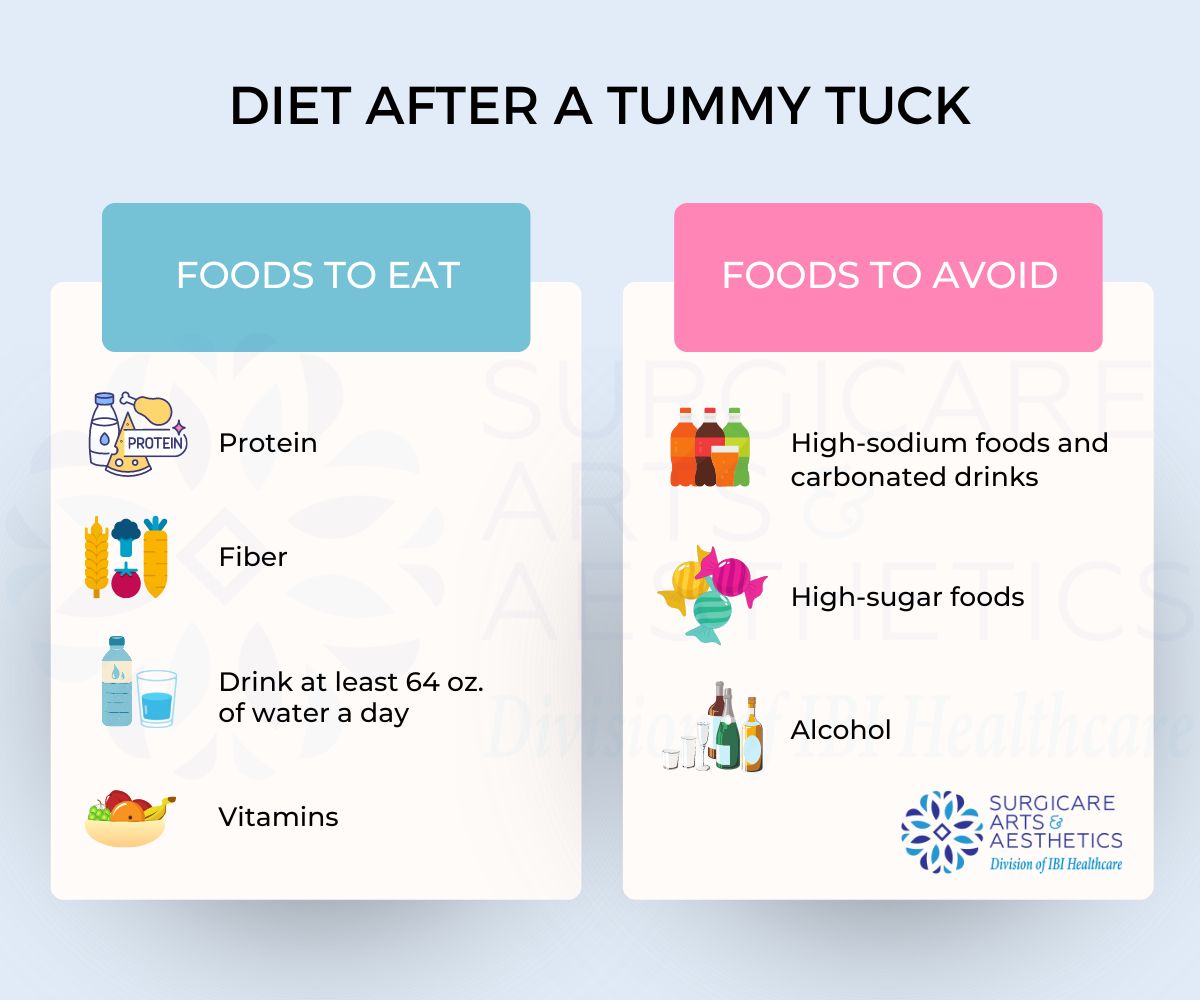There are numerous measures you can take after undergoing tummy tuck surgery to achieve a seamless, complication-free recovery that will have you showing off your gorgeous new figure as soon as possible. These include:
- Ensuring you get the right amount of rest;
- Following your aftercare instructions regarding wound care;
- Avoiding vigorous activities or exercise;
- Eating the right kinds of foods and staying hydrated.
Eating the proper nutrients will help your body heal quicker and more efficiently. Although you may feel well physically in the days after surgery, your body still needs extra rest and time to fully recover. The good news is that there are strategies to hasten your recovery so that you can get up and back to normal as soon as possible.
Today we are going to go over how eating the appropriate types of nutrients both prior to and after a tummy tuck can expedite healing and deliver optimal results.
What Should I Eat To Prepare For A Tummy Tuck?
Eating healthy meals before your surgery enables your body to recover quicker and return to your regular activities. Here are some good dietary choices to help get your body in prime healing shape!
Avoid processed meals, carbs, and sugary foods, which can lead to inflammation. Instead, choose things that are:
- Rich in Vitamin C to help expedite recovery time such as kale, guava, broccoli, blackcurrants, Brussel sprouts, etc;
- Full of Omega-3 like salmon, mackerel, soybeans, almonds, seeds, and nuts which help support your immune system and combat inflammation;
- Low in fat but packed with protein like lean poultry, fish, egg whites, and tofu;
- Drink plenty of water and boost your hydration levels by drinking electrolytes (Pedialyte, Gatorade, electrolyte pills).

Foods To Eat After A Tummy Tuck
You may help your body recuperate after surgery by consuming a nutritious diet. Eating sensibly also supports maintaining the results of your tummy tuck, enabling you to feel and look your absolute best.
Take it easy on your stomach during the first several days after the surgery. Begin with clear liquids, followed by soft, easily digestible foods. Anything high in protein and low in sugar and carbs is a smart choice. Some of the best foods to eat after a tummy tuck include:
- 1. Protein
- One of the most important elements to include in your diet after a tummy tuck is a lean protein. Protein is important for muscle, tissue, and skin restoration, which your body will be working hard to do after your tummy tuck. Fish, lean poultry, beans, eggs, cheese, skim milk, and Greek yogurt are good sources of protein. During the first few weeks of your recovery, you should attempt to eat extra protein, and protein shakes are an excellent way to ensure you are getting enough. Just ensure that the one you choose is low in carbs and sugar.
- 2. Fiber
- Increase your intake of fiber to help mitigate the risks of constipation that are often experienced as a result of pain medication taken after surgery. Some good sources of fiber include whole grains, brown rice, strawberries, apples, carrots, broccoli, beets, and other high-fiber vegetables, as well as almonds, pistachios, and sunflower seeds.
- 3. Stay hydrated
- Drink plenty of water and stay properly hydrated so you do not inhibit your recovery. Drink at least 64 ounces of water a day.
- 4. Vitamins
- Vitamins are an essential element in tummy tuck healing because they combat infection, decrease inflammation, and encourage cell regeneration. While vitamins may be obtained through supplements, the best method of obtaining vitamins is through your diet. Essential vitamins such as Vitamin A, Vitamin C, bromelain (from pineapple), zinc, etc. are contained in many of the foods you probably already eat. Some good sources for these vital elements include:
- Eggs;
- Dairy products;
- Green leafy veggies;
- Citrus/Pineapple;
- Tomatoes;
- Avocados;
- Nuts;
- Grains;
- Banana.
What Not To Eat After A Tummy Tuck
- 1. Foods that induce bloating
- Bloating and gas are two conditions that can impede healing and cause discomfort. High-sodium foods and carbonated drinks, such as soda and sparkling water, can cause uncomfortable bloating.
- 2. High-sugar foods
- You should avoid eating sugar-rich comfort foods. These snacks may seem appealing, but they will not aid in your recovery and are known to cause weight gain, which will affect the results of your tummy tuck.
- 3. Alcohol
- Alcohol should be avoided initially and consumed in moderation in the future. Consuming alcohol thins the blood, making it more difficult for the body to repair itself. It also contains calories and can cause weight gain and reverse the results of your tummy tuck. Avoid consuming any amount of alcohol if you are still taking pain medication to eliminate the risk of a negative interaction.
What Is The Schedule For Exercise After A Tummy Tuck?
A tummy tuck can deliver a flatter stomach, a more tapered waistline, and shapelier curves in one surgical session. Many patients choose to have a tummy tuck after losing a great deal of weight or after being pregnant. These events often leave the midsections with extra fat deposits and loose saggy skin.
Unfortunately, this area of the body is often resistant to traditional exercise and dieting efforts, and it can be especially disheartening when you’ve tried everything but still can’t seem to get those last few stubborn pounds off your tummy. Loose skin and abdominal muscles that have been stretched or torn will not repair themselves; however, a tummy tuck can address all of these issues.
Besides a healthy, well-balanced diet of nutritious foods, maintaining your tummy tuck results will entail regular physical activity.
- Post-surgery through day 13
- Patients are up and walking around the evening of their surgery to reduce the risk of blood clots. When the patient is discharged, the surgeon will send home aftercare instructions, advising them on how long they should spend walking and how many times per day they should do it. Most surgeons want patients to increase their activity incrementally as their discomfort eases.
- Weeks 2-4
- After about 14 days, patients can walk longer distances and more briskly, as well as use a low-impact elliptical machine or exercise bike.
- Weeks 4-6
- After the fourth week, they can begin to ramp up their intensity but avoid abdominal exercises like sit-ups and crunches. After the six-week mark, they can begin their typical workout or exercise routine, including working out the abdominal muscles. In fact, these exercises can help not only maintain but also improve the results of a tummy tuck.
Make sure to look for signs that you may be pushing your body too hard and too fast, exercising your tummy muscles past a comfortable level. Start ramping up your exercise slowly and gradually; you know your body best, so make sure you listen to it and stop when you feel like you need to.
Since everyone is different and heals at their own rate, and your surgery will be unique, speak to your surgeon about the best diet and exercise after a tummy tuck for you and your circumstances.
A Tummy Tuck At IBI Plastic Surgery & Med Spa Can Help You Get The Abs Of Your Dreams
If you are unhappy about loose skin, excess fat, or the way your tummy looks, IBI Plastic Surgery & Med Spa can help! Dr. Angelina Postoev is a triple-board certified cosmetic surgeon and an expert at abdominoplasty. Many patients combine a tummy tuck with other procedures in one surgery for optimal results. (A mommy makeover is one example.)
Dr. Angelina will speak with you about your medical history and the results you desire, and then together you will come up with the perfect plan to safely achieve your aesthetic goals.
Contact IBI Plastic Surgery & Med Spa today and set up a consultation to learn more!







